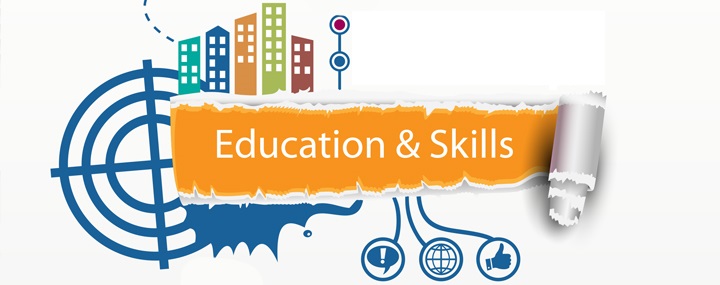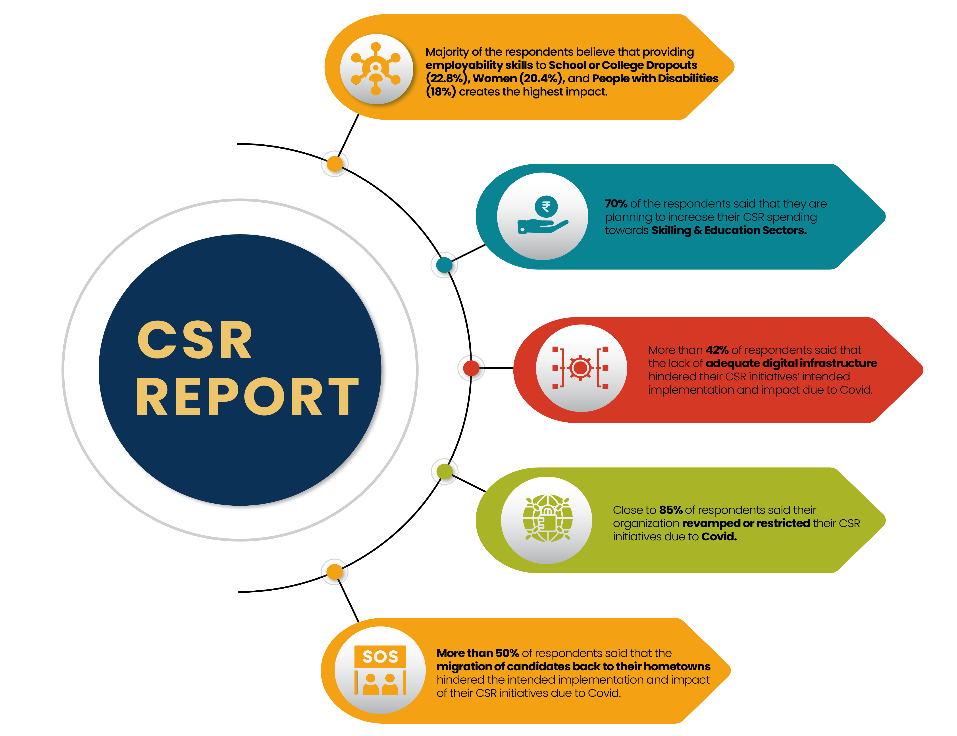 National: TeamLease EdTech, India’s leading learning solutions company, launched their latest survey, “Aligning Education and Skilling in the CSR Agenda”, a detailed survey analysing how India Inc., is spending their CSR funds within the education/skilling cohort, key challenges in the process and the future aspirations of organisations while aligning their CSR agenda. According to the survey, which was conducted with over 100 companies from across India, nearly 70 per cent expressed an intention to increase their CSR spends in education/skilling in the next fiscal. Incidentally, the majority of these companies want to allocate funds towards imparting vocational skills, which is the need of the hour to address the rising unemployability.
National: TeamLease EdTech, India’s leading learning solutions company, launched their latest survey, “Aligning Education and Skilling in the CSR Agenda”, a detailed survey analysing how India Inc., is spending their CSR funds within the education/skilling cohort, key challenges in the process and the future aspirations of organisations while aligning their CSR agenda. According to the survey, which was conducted with over 100 companies from across India, nearly 70 per cent expressed an intention to increase their CSR spends in education/skilling in the next fiscal. Incidentally, the majority of these companies want to allocate funds towards imparting vocational skills, which is the need of the hour to address the rising unemployability.
The survey indicates that companies are keen to dedicate funds towards projects that can create the maximum impact and according to the key findings, companies are directing the majority of their funds towards imparting employability skills to School or College Dropouts (22.8 per cent), Women (20.4 per cent), and People with Disabilities (18 per cent).
Commenting on the findings and the ecology, Shantanu Rooj, Founder & CEO, TeamLease EdTech, said, “India does not have a job crisis rather a skill crisis – we do not have enough employable talent to cater to the jobs that are there. Multiple measures have been taken to improve our education, but it is yet to solve the impending skill gap. We also face a high dropout crisis in higher education, further impacting employability. It is welcoming to see that corporates are looking at further increasing their spending in education/skilling- close to two-third of the respondents are planning to invest further. The investments coupled with active participation will help in addressing the gaps and enable our youth to beat the root cause of poverty and unemployment.”
 A comprehensive analysis of the survey also captures the current ecosystem; as per the survey 95.83 per cent of companies direct their CSR funds towards Education, Vocational Skilling, Livelihood Improvement, followed by 50 per cent for Health, Eradicating Hunger, Poverty and Malnutrition, Safe Drinking Water, and Sanitation. Close to 45.83 per cent of funds are also dedicated to initiatives that promote Gender Equality, Women Empowerment, Old Age Homes, Reducing Inequalities. In fact, organisations that divulge their funds into multiple arenas also dedicate a portion towards education -46 per cent of the respondents stated that they deploy more than 50 per cent of their funds towards Skilling and Education. While the intention and efforts are quite strong, companies are confronted with many challenges, especially while implementing their CSR programmes.
A comprehensive analysis of the survey also captures the current ecosystem; as per the survey 95.83 per cent of companies direct their CSR funds towards Education, Vocational Skilling, Livelihood Improvement, followed by 50 per cent for Health, Eradicating Hunger, Poverty and Malnutrition, Safe Drinking Water, and Sanitation. Close to 45.83 per cent of funds are also dedicated to initiatives that promote Gender Equality, Women Empowerment, Old Age Homes, Reducing Inequalities. In fact, organisations that divulge their funds into multiple arenas also dedicate a portion towards education -46 per cent of the respondents stated that they deploy more than 50 per cent of their funds towards Skilling and Education. While the intention and efforts are quite strong, companies are confronted with many challenges, especially while implementing their CSR programmes.
However, many organisations have been facing pertinent challenges while implementing their CSR programmes. Elaborating on this, Neeti Sharma, Co-Founder & President, TeamLease EdTech, said, “Accessibility, infrastructure, deployment continues to be a concern for companies. 70 per cent of companies mentioned that connecting the right candidates to the right opportunities is their major perplexity. Additionally, 42 per cent attributed to lack of infrastructure as a cause for distress. Even the pandemic hindered organic implementation of the CSR programmes, especially reverse migration.”
The good news is that the optimism for CSR programmes towards skilling and education is expected to continue in 2022. 85 per cent of companies have already revamped their CSR initiatives, aligned to COVID impact. Moreover, 80 per cent of companies have taken up special initiatives already to monitor and measure impact closely and 40 per cent are even spending more to analyse impact better.
These initiatives coupled with the right impetus from the government, for example, exemption on GST on CSR programmes is going to bring a revolution in the journey of bridging the employability gap and improving India’s skills capital.

